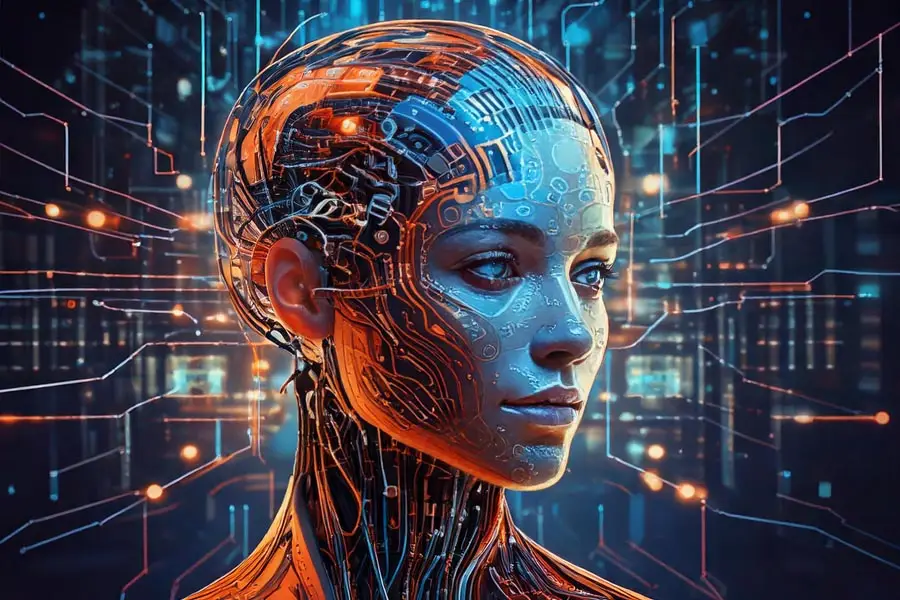The phrase artificial intelligence (AI) has gained popularity in recent years and is now used in many facets of our daily lives and businesses. But how does AI operate and what is it? With an emphasis on its definition, computer applications, and relevance in today’s society, this article seeks to provide readers a thorough grasp of artificial intelligence.
What is AI?
Fundamentally, artificial intelligence (AI) is the ability of a machine to mimic intelligent human behavior. This includes a variety of technologies that let robots to carry out operations like learning, reasoning, problem-solving, and comprehending natural language that normally need human intellect. There are two primary groups into which the field of AI can be separated:
- Narrow AI: This kind of artificial intelligence, also referred to as weak AI, is made to carry out a single task. For example, recommendation algorithms for music services and streaming services like Netflix examine user preferences to make content recommendations based on personal preferences.
- General AI: This alludes to a fictitious type of artificial intelligence that, like human cognitive capacities, is capable of comprehending, learning, and applying intellect across a broad range of tasks. General artificial intelligence is still a theoretical idea and has not yet been implemented.
What is AI in computers?
The inquiry “What is AI in computers?” explores the ways in which computer systems employ artificial intelligence. In order for computers to analyse information, learn from facts, and make judgments, artificial intelligence (AI) integrates sophisticated algorithms. The following are some essential elements of computer AI:
- Machine Learning (ML): Without explicit programming, machine learning—a type of artificial intelligence—allows computers to learn from data and gradually enhance their performance. To identify fraudulent transactions in financial systems, for instance, machine learning algorithms examine data patterns to provide classifications or predictions.
- Natural Language Processing (NLP): The relationship between computers and human language is the main emphasis of this area of artificial intelligence. Applications such as chatbots, virtual assistants, and language translation services are made possible by natural language processing (NLP), which enables machines to comprehend, interpret, and produce human language.
- Computer Vision: Applications like picture categorization and facial recognition are made possible by AI systems’ ability to evaluate and understand visual data from the environment. Computer vision, for example, is used by self- driving cars to navigate and make judgments depending on their environment.
These technologies demonstrate how artificial intelligence (AI) is applied to computers to improve accuracy and efficiency in a variety of applications, revolutionizing how we use technology.
What is artificial intelligence?
To put it another way, artificial intelligence is a wide range of methods and approaches intended to produce intelligent systems, not just one particular technology. Important fields for AI research and use include:
- Robotics: By fusing AI and robotics, computers can carry out intricate activities in real-world settings, such as industrial procedures or surgical procedures.
- Expert Systems: These AI programs simulate a human expert’s decision-making process by applying knowledge and inference rules to address particular challenges in industries like healthcare and finance.
- Reinforcement Learning: This kind of machine learning is frequently applied in robotics and gaming, where an agent learns to make decisions by being rewarded or punished according to its behaviour.
The evolution of artificial intelligence continues to pave the way for innovations that enhance our lives and redefine various industries.
Conclusion
In conclusion, knowing what artificial intelligence (AI) is, what it means in computers, and what it stands for is essential in today’s technologically advanced world. Our world is changing as a result of AI, which makes it possible for machines to carry out jobs that formerly required human intelligence. The potential benefits for our society are numerous as we investigate and advance AI technologies, ranging from boosting productivity and healthcare to completely changing how we interact with technology.
We will be better equipped to utilize AI’s advantages in the years to come if we keep up with its advancements.

